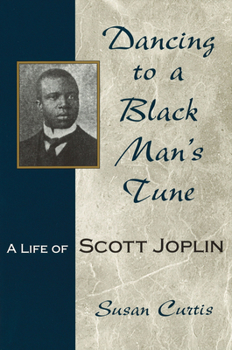Dancing to a Black Man's Tune: A Life of Scott Joplin
(Part of the Missouri Biography Series)
Select Format
Select Condition 
Book Overview
By using Scott Joplin's life as a window onto American social and cultural development at the turn of the century, this biography dramatizes the role of one brilliant African American musician in defining the culture of a still-young nation.
Format:Hardcover
Language:English
ISBN:0826209491
ISBN13:9780826209498
Release Date:June 1994
Publisher:University of Missouri Press
Length:288 Pages
Weight:1.52 lbs.
Dimensions:1.2" x 6.3" x 9.3"
Age Range:14 to 10 years
Grade Range:Grades 9 to 5
Customer Reviews
1 rating
The Worlds of Scott Joplin
Published by Thriftbooks.com User , 19 years ago
Scott Joplin (1868 -- 1917)was a great composer of the unique American music known as ragtime. Ragtime flourished from roughly 1900 -- 1920 when it faded into obscurity with the advent of jazz. It enjoyed a revival beginning in the 1970s with the movie "The Sting", several popular recordings, and the production of Joplin's opera Treemonisha. Ragtime is an enchanting American music, both lyrical and strongly rhythmical that has components of both classical music and jazz. I greatly enjoy playing Joplin's rags on the piano as well as the rags of his lesser-known but gifted colleagues, James Scott and Joseph Lamb. A full account of ragtime and its place in American culture remains to be written. Susan Curtis's book, "Dancing to a Black Man's Tune: A Life of Scott Joplin" is a start. Dr Curtis is Professor of History and American Studies and Director of Interdisciplinary Studies at Purdue University. It is thus understandable that her book draws widely on American history and on relationships between African Americans and whites in attempting to understand Scott Joplin and ragtime. Dr. Curtis discusses the important stages in Joplin's life and relates them to ongoing events in the United States with an emphasis on how African American - white relations impacted his music. She emphasizes, and necessarily so, the effects of slavery (one of Joplin's parents had been a slave) and of Reconstruction and Jim Crow. Dr. Curtis describes how African Americans remained on the outside of white America to a large extent. Still, African American music, ragtime in particular, had a great appeal for white Americans and led to the ideal of an inter-racial American culture. But Dr. Curtis's book shows, I think, that African American -- white relationships resist any simple summary. Joplin surely suffered from the effects of slavery and the rise of Jim Crow and from discrimination throughout his life. But Dr. Curtis also points out the ways in which black and white people worked together, how white people helped Joplin, and how Joplin encouraged the work of white composers of "negro" music. Joplin received piano lessons as a child from a German immigrant who recognized his talent. His music gained attention, probably, at the Chicago World's Fair in 1893 even though it lacked official status. There was substantial efforts at inter-racial harmony in Sedalia, Missouri where Joplin settled after a lengthy period as a wandering musician. His music was published and supported by John Stark, a white entrepeneur and he received encouragement from other white critics. When he moved to New York City, Joplin befriended and assisted in the publication of rags by Joseph Lamb, a gifted white composer of the music. Thus there was a great deal of complex interaction between black and white people in the origins and development of ragtime. The book includes considerations of Joplin's childhood in Texas, his years as a wandering musician, his life in Sedalia which s






